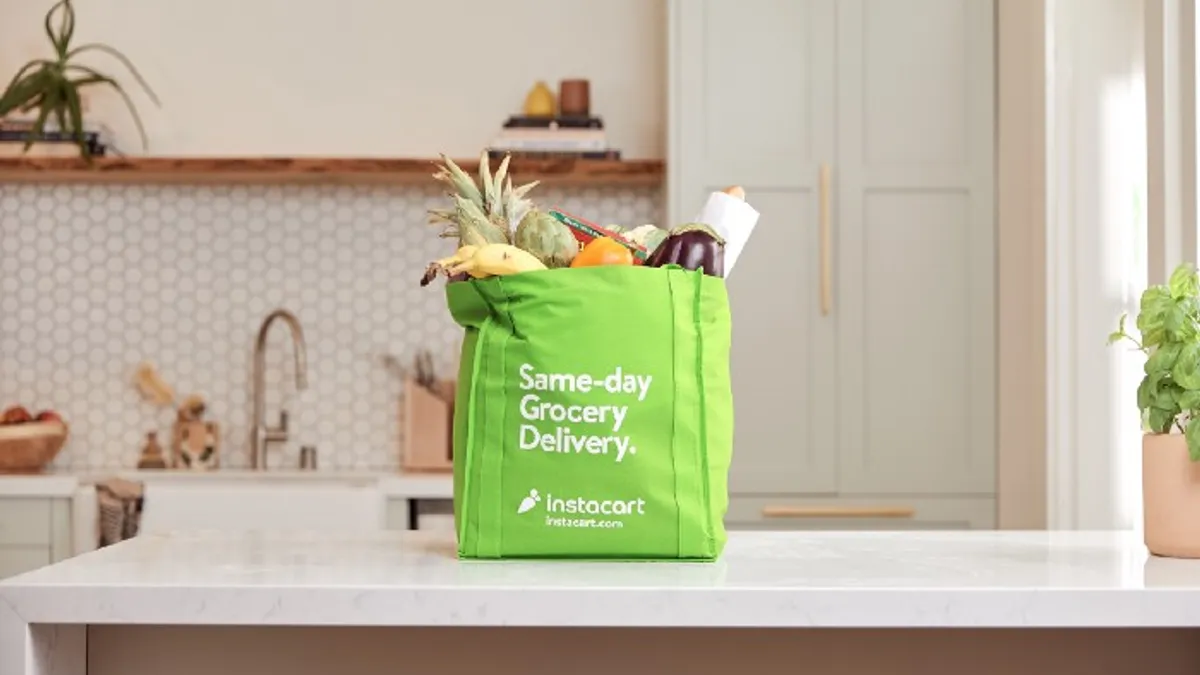Dive Brief:
- Instacart has appointed Christina Hall to the newly created role of chief human resources officer, according to an emailed statement. Hall, who starts on Monday, formerly served as chief people officer for LinkedIn.
- The e-commerce company has also named Ariel Bardin, formerly vice president of product management at YouTube, as senior vice president of product, a role that will put him in charge of Instacart’s consumer, enterprise and advertising operations. He will start on Oct. 27.
- Instacart is bolstering its senior executive ranks as it continues to bring in funding and reportedly is consulting with investment bankers about going public.
Dive Insight:
Instacart’s decision to hire seasoned managers with experience at other high-profile technology firms is the latest in a string of moves by the e-commerce company as it looks to capitalize further on its rapid rise.
Hall, who worked at Facebook and Intuit before joining LinkedIn, will be in charge of Instacart’s human resources and recruiting efforts as well as its diversity, equity and inclusion initiatives. Although Instacart is touting her experience at LinkedIn, her 2019 departure from the Microsoft-owned social media company left open questions about why she left the tech firm. According to Bloomberg, she resigned from LinkedIn after breaking internal “compliance" rules.
Bardin is arriving at Instacart after more than 15 years in a variety of roles at Google, including vice president of product management for the tech giant’s YouTube video subsidiary. He also worked on product strategy and business development for Google Payments, and was a leader of the company’s AdWords operation.
Instacart has spent 2020 consolidating its position as a leading partner to supermarkets and other retailers looking to serve online customers. Instacart, which is valued at $17.7 billion following a recent $200 million round of fundraising, has inked deals with more than 150 retailers this year, including companies outside the grocery space like Sephora, 7-Eleven and Bed Bath & Beyond.
As it has expanded, Instacart has courted controversy and faced pushback from the growing army of shoppers who deliver groceries and other goods sold by its partner retailers. Accused of placing its financial success above the safety of the gig workers it depends on as the pandemic gained steam, the company began offering free COVID-19 screenings to its shoppers in August.
The company has also faced criticism for the way it pays shoppers, and was sued in August by the District of Columbia’s attorney general of for allegedly deceiving customers into incorrectly thinking an optional service fee was used to provide tips to workers
Instacart turned its first profit this year, according to an April report in The Information, and now handles e-commerce orders for more than 40,000 stores in 5,500 U.S. and Canadian cities run by over 500 retailers. The Financial Times recently reported that the company, which dwarfs rivals like Target-owned Shipt, is preparing for a possible IPO during the first six months of 2021.
Even as it powers ahead, however, Instacart is looking over its shoulder at new and potentially robust competition from Uber and DoorDash, which have both recently begun scaling their grocery delivery business in the U.S. Uber offers delivery in Dallas and Miami and recently announced a partnership with Southeastern Grocers, while DoorDash has linked up with Smart & Final, Meijer, Fresh Thyme Market and others.













